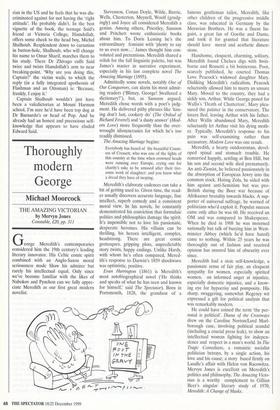Thoroughly modern George Michael Moorcock
THE AMAZING VICTORIAN by Mervyn Jones
Constable, £20, pp. 311
George Meredith's contemporaries considered him the 19th century's leading literary innovator. His Celtic comic spirit combined with an Anglo-Saxon moral seriousness made Shaw his admirer but rarely his intellectual equal. Only since we've become familiar with the likes of Nabokov and Pynchon can we fully appre- ciate Meredith as our first great modern novelist. Stevenson, Conan Doyle, Wilde, Barrie, Wells, Chesterton, Meynell, Woolf (grudg- ingly) and Joyce all considered Meredith a genius. Among others, Priestley, Sassoon and Pritchett wrote enthusiastic books about him. To Doris Lessing he's the extraordinary feminist with 'plenty to say to us even now...' James thought him con- voluted and pretentious. Meredith shared a relish for the full linguistic palette, but was James's master in narrative experiment, especially in his last complete novel The Amazing Marriage (1895).
Admittedly some novels, notably One of Our Conquerors, can alarm his most admir- ing readers ('Blimey, George! Swallered a dictionary?'), but, as Sassoon argued, Meredith chose words with a poet's judg- ment. He delivered pithy phrases like 'kiss- ing don't last, cookery do' (The Ordeal of Richard Feverel) and 'a dusty answer' (Mod- em Love) more frequently than the over- wrought idiosyncrasies for which he's too readily dismissed.
The Amazing Marriage begins:
Everybody has heard of the beautiful Count- ess of Cressett, who was one of the lights of this country at the time when crowned heads were running over Europe, crying out for charity's sake to be amused after their tire- some work of slaughter: and you know what a dread they have of moping.
Meredith's elaborate cadences can take a bit of getting used to. Given time, the read- er usually discovers accurate language, fine intellect, superb comedy and a consistent moral view. In his novels, he constantly demonstrated his conviction that formulaic politics and philosophies damage the spirit. It's impossible not to love his passionate, desperate heroines. His villains can be thrilling, his heroes intelligent, complex, headstrong. There are great comic grotesques, gripping plots, unpredictable story twists, happy endings. Unlike Hardy, with whom he's often compared, Mered- ith's response to Darwin's 1859 shocicwave was optimistic, positive.
Evan Harrington (1861) is Meredith's most autobiographical novel (lie thinks and speaks of what he has seen and known for himself,' said The Spectator). Born in Portsmouth, 1828, the grandson of a
famous gentleman tailor, Meredith, like other children of the progressive middle class, was educated in Germany by the Moravian Brothers. He was a fluent lin- guist, a great fan of Goethe and Dante, and took it for granted that literature should have moral and aesthetic dimen- sions.
Handsome, eloquent, charming, solitary, Meredith found Chelsea digs with Swin- bume and Rossetti a bit boisterous. Foot:, scarcely published, he courted Thomas Love Peacock's widowed daughter Mary. Disliking Meredith's radicalism, Peacock reluctantly allowed him to marry an unsure Mary. Moved to the country, they had a sickly son, Arthur. While George posed for Wallis's 'Death of Chatterton', Mary plea- sured the painter in the conservatory. The lovers fled, leaving Arthur with his father. After Wallis abandoned Mary, Meredith reluctantly let Arthur visit his dying moth- er. Typically, Meredith's response to his pain was self-examining rather than accusatory. Modem Love was one result.
Meredith, a hearty outdoorsman, devel- oped spinal and stomach trouble. He remarried happily, settling at Box Hill, but his son and second wife died prematurely. An anti-Zionist, he believed passionately in the absorption of European Jewry into the common stock. Hating Zola, he sided with him against anti-Semitism but was pro- British during the Boer war because of Afrikaaner brutality towards blacks. A sup- porter of universal suffrage, he warned of politicians who'd exploit it. Popular success came only after he was 60. He received an OM and was compared to Shakespeare. When he died in 1908 he was mourned nationally but talk of burying him in West- minster Abbey (which he'd have hated) came to nothing. Within 25 years he was thoroughly out of fashion and received opinion has assured him of obscurity ever since.
Meredith had a stoic self-knowledge, a passionate sense of fair play, an eloquent sympathy for women, especially spirited women, an informed anger at injustice, especially domestic injustice, and a know- ing eye for hypocrisy and pomposity. His sharp, swaggering, somewhat Regency wit expressed a gift for political analysis that was remarkably modern.
He could have coined the term 'the per- sonal is political'. Diana of the Crossways drew on the Caroline Norton/Lord Marl- borough case, involving political scandal (including a crucial press leak), to show an intellectual woman fighting for indepen- dence and respect in a man's world. In The Tragic Comedians, a romantic socialist politician betrays, by a single action, his love and his cause; a story based firmly on Lasalle's affair with Helen von Racowitza. Mervyn Jones is excellent on Meredith's politics and philosophy. The Amazing Victo- rian is a worthy complement to Gillian Beer's singular literary study of 1970, Meredith: A Change of Masks.






















































































































 Previous page
Previous page